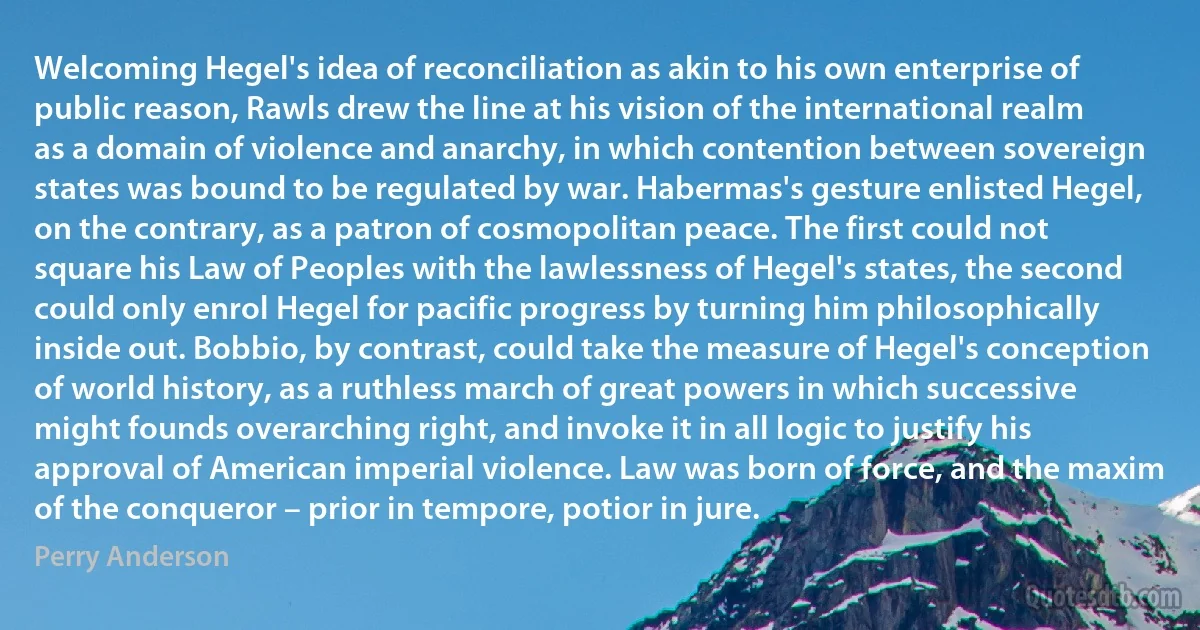
Welcoming Hegel's idea of reconciliation as akin to his own enterprise of public reason, Rawls drew the line at his vision of the international realm as a domain of violence and anarchy, in which contention between sovereign states was bound to be regulated by war. Habermas's gesture enlisted Hegel, on the contrary, as a patron of cosmopolitan peace. The first could not square his Law of Peoples with the lawlessness of Hegel's states, the second could only enrol Hegel for pacific progress by turning him philosophically inside out. Bobbio, by contrast, could take the measure of Hegel's conception of world history, as a ruthless march of great powers in which successive might founds overarching right, and invoke it in all logic to justify his approval of American imperial violence. Law was born of force, and the maxim of the conqueror – prior in tempore, potior in jure.
Perry AndersonRelated topics
born bound conception contrast cosmopolitan drew enlisted force gesture great history idea imperial inside international law line march might measure pacific peace public reason right second square take turning vision war welcoming world lawlessness hegel overarching peoples statesRelated quotes
Nothing, I suppose, could better demonstrate than the Suez crisis the extent to which the United Nations had remained a central factor in our foreign policy. Our problem was, and is, one of long standing, how to bring about a creative peace and a security which will have a strong foundation. It remained my conviction that there could never be more than a second-best substitute for the UN in preserving the peace. Organizations such as NATO were necessary and desirable only because the UN was not effective as a security agency. UNEF was a step in the right direction in putting international force behind an international decision. The birth of that force had been sudden and had been surgical. The arrangements for the reception of the infant were rudimentary, and the midwives had no precedents or genuine experience to guide them.

Lester B. Pearson
My God! I have often regretted that I was born! I have often wished to fall back even into nothingness, rather than advance through so many falsehoods, so many sufferings, and so many successive losses, towards that loss of ourselves which we call death! Still, even in those moments of terrible faintheartedness, when despair overmasters reason, and when man forgets that life is a task imposed upon him to finish, I have always said to myself: "There are some things which I would regret not to have tasted - a mother's milk, a father's love, that relationship of heart and soul between brothers, household affections, joys, and even cares!" Our family is evidently our second self, more than self, existing before self, and surviving self with the better part of self. It is the image of the holy and loving unity of beings revealed by the small group of creatures who hold to one another, and made visible by feeling!

Alphonse de Lamartine
[T]he rapid march of scientific discovery...made me feel that it was quite within the realm of possibility that one day there might be an invention which would neutralise our [naval] superiority, and reduce us to equality with, if not inferiority to, our neighbours. ... In such an event our position would be one of complete helplessness in the face of an invader with a powerful army. ... We had two fundamental weaknesses in such a contingency. The first was that our army was too insignificant to stand up against the gigantic forces on the Continent. The second was that we were so overwhelmingly dependent upon overseas supplies for our food, that if these were cut off we should, within a few months, be brought to the very verge of starvation. It was this consideration amongst others that always led me to urge that we ought to devote more thought to the development of the resources of British soil.

David Lloyd George
We all feel relief that war has not come this time. Every one of us has been passing through days of anxiety; we cannot, however, feel that peace has been established, but that we have nothing but an armistice in a state of war. We have been unable to go in for care-free rejoicing. We have felt that we are in the midst of a tragedy. We have felt humiliation. This has not been a victory for reason and humanity. It has been a victory for brute force. At every stage of the proceedings there have been time limits laid down by the owner and ruler of armed force. The terms have not been terms negotiated; they have been terms laid down as ultimata. We have seen to-day a gallant, civilised and democratic people betrayed and handed over to a ruthless despotism. We have seen something more. We have seen the cause of democracy, which is, in our view, the cause of civilisation and humanity, receive a terrible defeat.

Clement Attlee
In the Cabinet there were large Irish proprietors, and, without imputing to any proprietor a desire of doing injustice to his tenants, it was easy to understand that after the long continuance of the present state of the law in Ireland, proprietors were alarmed at any proposition coming to them like the Bill of the hon. Member for Rochdale. The Irish proprietors in the Cabinet, in that House, and out of it, were afraid of a Bill that would interfere with the powers and privileges that a Parliament of landowners for generations past had been conferring upon the proprietors of the soil. That was the point. The question was, could the cats wisely and judiciously legislate for the mice? He did not believe it. He was as much opposed as any man could be to transferring the land from the landlord to the tenant; but a measure of justice was due from the former to the latter, both in Ireland and in this country as well.

John Bright
